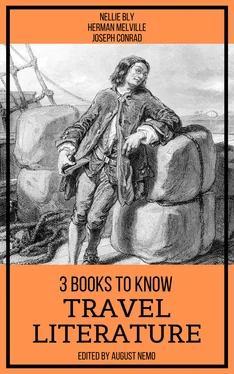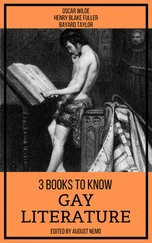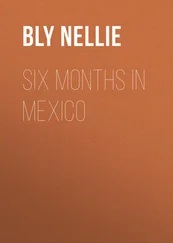"'You forget, dear Charlie, that the laborer is worthy of his hire,' she said, brightly. It's queer how out of touch with truth women are. They live in a world of their own, and there had never been anything like it, and never can be. It is too beautiful altogether, and if they were to set it up it would go to pieces before the first sunset. Some confounded fact we men have been living contentedly with ever since the day of creation would start up and knock the whole thing over.
"After this I got embraced, told to wear flannel, be sure to write often, and so on—and I left. In the street—I don't know why—a queer feeling came to me that I was an impostor. Odd thing that I, who used to clear out for any part of the world at twenty-four hours' notice, with less thought than most men give to the crossing of a street, had a moment—I won't say of hesitation, but of startled pause, before this commonplace affair. The best way I can explain it to you is by saying that, for a second or two, I felt as though, instead of going to the center of a continent, I were about to set off for the center of the earth.
"I left in a French steamer, and she called in every blamed port they have out there, for, as far as I could see, the sole purpose of landing soldiers and custom-house officers. I watched the coast. Watching a coast as it slips by the ship is like thinking about an enigma. There it is before you—smiling, frowning, inviting, grand, mean, insipid, or savage, and always mute with an air of whispering, 'Come and find out.' This one was almost featureless, as if still in the making, with an aspect of monotonous grimness. The edge of a colossal jungle, so dark-green as to be almost black, fringed with white surf, ran straight, like a ruled line, far, far away along a blue sea whose glitter was blurred by a creeping mist. The sun was fierce, the land seemed to glisten and drip with steam. Here and there grayish-whitish specks showed up, clustered inside the white surf, with a flag flying above them perhaps. Settlements some centuries old, and still no bigger than pin-heads on the untouched expanse of their background. We pounded along, stopped, landed soldiers; went on, landed custom-house clerks to levy toll in what looked like a God-forsaken wilderness, with a tin shed and a flag-pole lost in it; landed more soldiers—to take care of the custom-house clerks, presumably. Some, I heard, got drowned in the surf; but whether they did or not, nobody seemed particularly to care. They were just flung out there, and on we went. Every day the coast looked the same, as though we had not moved; but we passed various places—trading places—with names like Gran' Bassam Little Popo, names that seemed to belong to some sordid farce acted in front of a sinister backcloth. The idleness of a passenger, my isolation amongst all these men with whom I had no point of contact, the oily and languid sea, the uniform somberness of the coast, seemed to keep me away from the truth of things, within the toil of a mournful and senseless delusion. The voice of the surf heard now and then was a positive pleasure, like the speech of a brother. It was something natural, that had its reason, that had a meaning. Now and then a boat from the shore gave one a momentary contact with reality. It was paddled by black fellows. You could see from afar the white of their eyeballs glistening. They shouted, sang; their bodies streamed with perspiration; they had faces like grotesque masks—these chaps; but they had bone, muscle, a wild vitality, an intense energy of movement, that was as natural and true as the surf along their coast. They wanted no excuse for being there. They were a great comfort to look at. For a time I would feel I belonged still to a world of straightforward facts; but the feeling would not last long. Something would turn up to scare it away. Once, I remember, we came upon a man-of-war anchored off the coast. There wasn't even a shed there, and she was shelling the bush. It appears the French had one of their wars going on thereabouts. Her ensign dropped limp like a rag; the muzzles of the long eight-inch guns stuck out all over the low hull; the greasy, slimy swell swung her up lazily and let her down, swaying her thin masts. In the empty immensity of earth, sky, and water, there she was, incomprehensible, firing into a continent. Pop, would go one of the eight-inch guns; a small flame would dart and vanish, a little white smoke would disappear, a tiny projectile would give a feeble screech—and nothing happened. Nothing could happen. There was a touch of insanity in the proceeding, a sense of lugubrious drollery in the sight; and it was not dissipated by somebody on board assuring me earnestly there was a camp of natives—he called them enemies!—hidden out of sight somewhere.
"We gave her her letters (I heard the men in that lonely ship were dying of fever at the rate of three a day) and went on. We called at some more places with farcical names, where the merry dance of death and trade goes on in a still and earthy atmosphere as of an overheated catacomb; all along the formless coast bordered by dangerous surf, as if Nature herself had tried to ward off intruders; in and out of rivers, streams of death in life, whose banks were rotting into mud, whose waters, thickened into slime, invaded the contorted mangroves, that seemed to writhe at us in the extremity of an impotent despair. Nowhere did we stop long enough to get a particularized impression, but the general sense of vague and oppressive wonder grew upon me. It was like a weary pilgrimage amongst hints for nightmares.
"It was upward of thirty days before I saw the mouth of the big river. We anchored off the seat of the government. But my work would not begin till some two hundred miles farther on. So as soon as I could I made a start for a place thirty miles higher up.
"I had my passage on a little sea-going steamer. Her captain was a Swede, and knowing me for a seaman, invited me on the bridge. He was a young man, lean, fair, and morose, with lanky hair and a shuffling gait. As we left the miserable little wharf, he tossed his head contemptuously at the shore. 'Been living there?' he asked. I said, 'Yes.' 'Fine lot these government chaps—are they not?' he went on, speaking English with great precision and considerable bitterness. 'It is funny what some people will do for a few francs a month. I wonder what becomes of that kind when it goes up country?' I said to him I expected to see that soon. 'So-o-o!' he exclaimed. He shuffled athwart, keeping one eye ahead vigilantly. 'Don't be too sure,' he continued. 'The other day I took up a man who hanged himself on the road. He was a Swede, too.' 'Hanged himself! Why, in God's name?' I cried. He kept on looking out watchfully. 'Who knows? The sun too much for him, or the country perhaps.'
"At last we opened a reach. A rocky cliff appeared, mounds of turned-up earth by the shore, houses on a hill, others, with iron roofs, amongst a waste of excavations, or hanging to the declivity. A continuous noise of the rapids above hovered over this scene of inhabited devastation. A lot of people, mostly black and naked, moved about like ants. A jetty projected into the river. A blinding sunlight drowned all this at times in a sudden recrudescence of glare. 'There's your Company's station,' said the Swede, pointing to three wooden barrack-like structures on the rocky slope. 'I will send your things up. Four boxes did you say? So. Farewell.'
"I came upon a boiler wallowing in the grass, then found a path leading up the hill. It turned aside for the bowlders, and also for an undersized railway-truck lying there on its back with its wheels in the air. One was off. The thing looked as dead as the carcass of some animal. I came upon more pieces of decaying machinery, a stack of rusty rails. To the left a clump of trees made a shady spot, where dark things seemed to stir feebly. I blinked, the path was steep. A horn tooted to the right, and I saw the black people run. A heavy and dull detonation shook the ground, a puff of smoke came out of the cliff, and that was all. No change appeared on the face of the rock. They were building a railway. The cliff was not in the way or anything; but this objectless blasting was all the work going on.
Читать дальше












